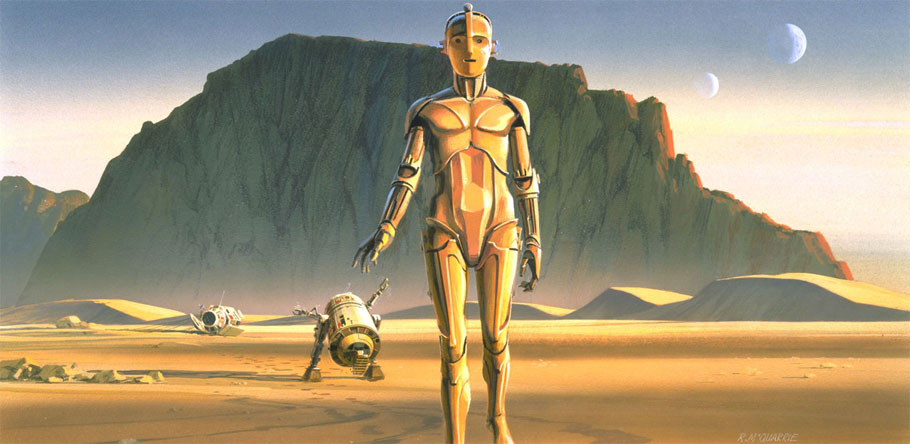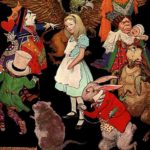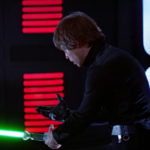Pretense or Reality
Last week I came across an article titled, “Are Droids Slaves?” The droids in question were the droids of Star Wars, and the answer was so unequivocally Yes I wondered why they bothered with the diffident headline. “Droids Are Slaves” would have suited the article better, and “Droids Are Slaves, And the Rebels Are Rotten, Lowlife Slave-Masters” would have truly captured its spirit. I disagreed with almost every word of the article, but it reminded me of one of the things I love most about science fiction: You get to ask such interesting questions.
The author – a Star Wars radical, I promise you – writes that he “realized that the destruction of Alderaan was not only justified, but prudent.” This is completely beside the point, but I include it because, you know. Whoa.
 In its main point (to wit: droids are slaves), the article is unconvincing. The assertion that droids are slaves rests on the idea that they are sentient, and the case that they are sentient rests on huge extrapolations from small details. Hence Threepio’s exclamation “Thank the Maker!” is said to prove that droids have their own theology, and Luke’s comment on Artoo’s “devotion” means – why didn’t you think of this? – that droids have free will. Also, the fact that Artoo is told he will “learn respect” means he’s sentient, because otherwise respect “could simply be programmed.”
In its main point (to wit: droids are slaves), the article is unconvincing. The assertion that droids are slaves rests on the idea that they are sentient, and the case that they are sentient rests on huge extrapolations from small details. Hence Threepio’s exclamation “Thank the Maker!” is said to prove that droids have their own theology, and Luke’s comment on Artoo’s “devotion” means – why didn’t you think of this? – that droids have free will. Also, the fact that Artoo is told he will “learn respect” means he’s sentient, because otherwise respect “could simply be programmed.”
After a description of the droids’ capture and reselling by the Jawas – a description that paints it as a harrowing ordeal of suffering and cruelty, unlike the prudent incineration of several billion people – the author gets to the “restraining bolts”: “The very need for restraining bolts [to prevent the droids’ escape] reinforces the notion that the droids are sentient creatures with free will and their own ideas, hopes, and dreams.”
Maybe. Or maybe stolen droids are apt to go wandering back to their original owners because of programming. You weigh the theories, but I think mine is less of a leap.
The droids of Star Wars can give an appearance of sentience, but is this pretense or reality? Do they have any intelligence or will of their own, or are they only machines acting out, in a highly advanced way, the purposes, knowledge, and motivations of their inventors? I choose the second interpretation, but then, that is the way my assumptions run. I have never thought it possible for humanity to create a sentient species.
This question is never raised in “Are Droids Slaves?”, but it’s fundamental to the issue and certainly the most interesting part of the debate, with meaning far beyond one set of movies. To consider the droids slaves is not only to impute consciousness to them, but consciousness on a level with our own.  It is to assume that humanity can create that consciousness in other beings, can in fact create whole races. (Incidentally, this puts a whole new shade of meaning to Threepio’s “Thank the Maker!” Our intrepid author regards this as genuine droid religion – but who is the god of this religion? Because the droids’ maker is Man.)
It is to assume that humanity can create that consciousness in other beings, can in fact create whole races. (Incidentally, this puts a whole new shade of meaning to Threepio’s “Thank the Maker!” Our intrepid author regards this as genuine droid religion – but who is the god of this religion? Because the droids’ maker is Man.)
How credible you find the idea of humanity recreating our sentience in our machines will depend a great deal on what measure you take of our sentience. If you believe that human sentience is the result of blind evolution in the physical world, then it seems logical enough that intelligent evolution in the mechanical world might also result in sentience. But if you believe that human sentience is a divine spark – is, in fact, the divine image in us – then the idea of building that divine spark into a machine is a lot more doubtful.
And this, as I said, is one of the things I love about science fiction. It leads to the most interesting questions, which can, if we’re not careful, raise the most important questions.











































One thing that always bothered me about the Star Wars films was the scene in Jabba’s palace, or more specifically, under it. Why the droid torture chamber? If droids could be programmed to obey, why use that area as a means to teach them a lesson, learn respect. The droid in charge of that area (EV-9D9, I think) implied a threat by informing C3PO of what happened to the last protocol droid. He was then fitted with a restraining bolt in Jabba’s palace.
I agree with your thoughts, that restraining bolts and such could have been measures to prevent the droid from returning to the original master. But the torture chamber? What was the point of searing one droid’s feet or pulling another droid apart? Just more questions 🙂
And isn’t it credible? Not that I agree with doing so, but scientists have already managed to clone animals. Just one more step, right? Puts a knot in my stomach to think about it.
The thing is, the droids are characters. Their sentience is an illusion, like all other characters’. Would we even care about these fictional machines if they didn’t have the trappings of personality?
Today’s meta commentary is brought to you by the letter さ.
To piggyback on Notleia’s comment: the droids are as much a character as anyone else in the fictional Star Wars universe. While they are machines, they are presented as having far more personality and will than, say, the ships and dwellings. They don’t appear unhappy in their lot as property, but they are more than toasters. Honestly, if Data is allowed to have sentience and chose his destiny, C-3PO and any other droids ought to be afford the same respect as characters.
And why stop with these two fandoms for such an important, timely topic? The whole debate of machine sentience and the possibility of a soul is a well-traveled science fiction subject that has been explored in many different mediums and eras. The best exploration of the subject from a Christian perspective, for my money, is the Lamb Among the Stars by Chris Walley (I will keep plugging this series until it gets the attention it deserves). The author really delves into the spiritual possibilities of a sentient, “artificial” life form.